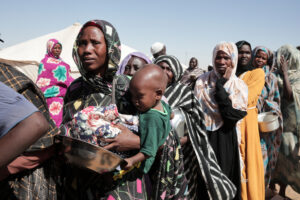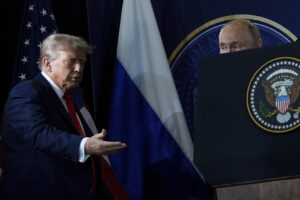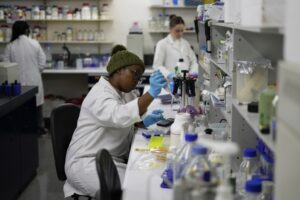Former Philippine President Duterte’s Arrest and the Broader Southeast Asian War on Drugs
Ex-Philippine President Duterte’s arrest highlights Southeast Asia’s brutal war on drugs. From Mary Jane Veloso’s near execution in Indonesia to the militarized drug crackdowns in the Golden Triangle––when will the region break the cycle and establish a more humane approach to tackling drug-related issues?

"Critics have called Duterte’s all-out anti-drug policy inhumane." [Ted Regencia/ via Al Jazeera]
From 2016 to 2022, Filipinos endured endless cycles of fear under the Rodrigo Duterte Administration and his “war on drugs” campaign. They felt at risk in the streets—and even more so in their own homes. Under Operational Plan “Tuktok Hangyo,” commonly known as OPLAN Tokhang, President Duterte authorized the Philippine National Police (PNP) to enter the homes of suspected drug users and persuade them to surrender. The alleged users were predominantly vulnerable Filipinos living in impoverished communities, where systemic disadvantages and aggressive police tactics may have made them more susceptible to coercion and subject to arrest under falsified claims by the PNP. This led to the merciless killing of over 30,000 accused drug users during Duterte’s term. After years of demanding justice and reparations, the victims’ families were pleased to hear about Duterte’s arrest under an International Criminal Court (ICC) warrant on March 11 of this year. His arrest marks a pivotal moment in ensuring accountability and justice for the people. However, the extrajudicial killings and deep-seated belief that harsh punishments would eliminate drug-related crimes persists in other Southeast Asian countries.
Remembering Veloso’s Story: Indonesia and the Philippines
When commemorating the lives lost due to Duterte’s anti-drug campaign, we must look back at the stories of those who fought and survived. In one instance in 2010, both Indonesia and the Philippines wrongfully detained a Filipina migrant, Mary Jane Veloso, who unintentionally carried 2.6 kilograms of heroin into Indonesia from the Philippines, which was placed in her luggage by her job recruiter who promised her a job. Despite proving her innocence, the Indonesian government sentenced her to death. Indonesia, despite remaining a “major drug smuggling hub,” has one of the strictest drug laws in the world, and currently 530 people are on death row, mostly for drug-related crimes. Duterte told Indonesia’s President Joko Widodo to“[g]o ahead if you want to execute her.” Surprisingly, two days before her execution in 2015, her recruiter surrendered herself to the Philippine government. This further supported the claims that Veloso was a victim of human trafficking,consequently delaying her execution. In 2024, Veloso was released from Indonesia, prompting Indonesia’s senior minister of law, Yusril Ihza Mahendra, to claim that , “[i]f the Philippines want to pardon Veloso or grant clemency, that is entirely their authority and we must also respect.” Under the agreement, Veloso is now banned from entering Indonesia for life. Veloso’s case illustrates how Southeast Asia’s unforgiving drug policies intersect with migration and human trafficking, and it casts a shadow over Duterte’s legacy—one now under global scrutiny as ICC proceeds with its investigation into crimes against humanity committed during his drug war.
The Golden Triangle: Myanmar, Thailand, and Laos
Other Southeast Asian nations have similarly responded to drug-related issues with punitive, often militarized approaches. One of the most notorious examples is the Golden Triangle region, one of the world’s largest drug trafficking areas, located at the borders of Myanmar, Thailand, and Laos. Due to high supply, methamphetamine pills cost as little as 25 cents––cheaper than basic necessities. This exemplifies the ongoing struggles of impoverished Southeast Asians who succumb to drug addiction and trafficking. Myanmar has surpassed Afghanistan as the world’s leading producer of opium, and its production has rapidly increased after China’s suppression of organized drug trafficking and production. In Laos, 315 people are currently on death row—311 of them for drug-related offenses. The Laotian government continues to enforce the death penalty for drug-related offenses, framing it as an essential component of its national anti-drug campaign strategy. Thailand, a major trafficking route for illicit drugs from the Golden Triangle, also enforces the death penalty for drug-related convictions, and suspected drug users are often denied access to rehabilitation programs. On February 1, 2003, Prime Minister Thaksin Shinawatra officially declared a war on drugs, instructing security officers to “shoot to kill” Burmese drug traffickers. On February 16, only sixteen days after the war on drugs began, the Ministry of the Interior stated that 596 people had been killed––this increased to 2,593 murder cases by October 2003. Thousands of drug-related convictions. Thousands of deaths. And still, the war on drugs carries on. How can extrajudicial executions and violence serve as the cornerstone of a just nation?
Southeast Asian Nations’ Move
The ICC holding Duterte accountable should serve as a precedent for Southeast Asian countries to reevaluate their current drug prohibition laws. The death penalty and the “zero tolerance policy” have been proven ineffective deterrents for drug-related crime. Southeast Asian nations should take a pause in stopping drug distribution and dismantle criminal syndicates instead. Rather than perpetuating cycles of violence, these countries should invest in drug rehabilitation programs, and address the factors that lead people to the excessive production and trafficking of drugs. Justice remains incomplete as long as much of Southeast Asia continues to wage a war on drugs—and as long as those in power fail to center human rights in reducing drug-related crimes.
Editors
Julia Bails, Managing Editor
Nicole Monette, Copy-Editor

Kyla (she/they) will complete her undergraduate degree in History at NYU in 2026. She aspires to be a Ph.D. and J.D. student, with scholarly interests in movement and migration, invisible spaces of labor, and the sustainable, ethical, and cultural uses of land and estate. Kyla is passionate about transnational labor law and the Southeast Asian diaspora. Her works on tecno-colonialism and digital labor, accent bias in the Filipino diaspora, and analysis of Filipino classrooms perpetuating injustices have all been accepted at research conferences. She is currently working on research about collective labor of the Aeta tribe in the Philippines, and the neoliberal exploitation of domestic Filipina laborers in Saudi Arabia. She is also currently interning at the NYS Senate Chair of Committee on Labor. In Kyla’s free time, she enjoys watching the reality show “Survivor” and is convinced she could win the show.




